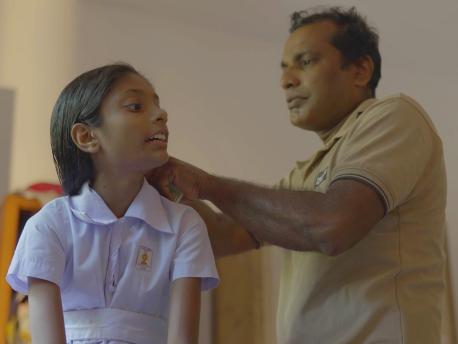
Families Living on the Edge as Sri Lanka's Economic Crisis Deepens
The unfolding economic crisis in Sri Lanka is making it increasingly hard for families to make ends meet. Food and fuel prices are pushing staples like milk, rice, lentils and cooking oil out of reach for many. Frequent power cuts are leaving Sri Lankan families in the dark.
For 12-year-old Niruthma and her 14-year-old brother, Thenuka, the crisis means they can only see their dad, Chandana Najith, once a week. Gasoline is increasingly hard to come by, so he can no longer afford the daily commute by motorbike from the family's home to his job as a health worker.
Food and fuel prices are slipping out of reach for many
"I used to go to work and come home on my bike every day," he says. "But I can't do that anymore. With the increase in fuel prices and the long hours spent in fuel queues, there's no time to get back home each day." He has moved into a boarding house to conserve precious fuel for his weekend visits home.
But the added boarding house expense is one he can ill afford. "I took a loan to build my house," he says. "I fear I won't be able to manage my salary to pay the house loan, pay for my kids' education and other expenses at home."
Sri Lanka's economic crisis is reshaping the way children live:
Schoolbooks are more expensive now, and power cuts in the evening mean it's harder to find a well-lit place to study. Niruthma and Thenuka's mother, Inoka Damayanthi, used to give them milk every morning and every evening, but milk powder is too expensive now. '"Kids don't know much about the price increase," she says.
UNICEF and partners are working to provide urgently needed assistance to children in need across Sri Lanka
"UNICEF's assessment is that 2.3 million — nearly 1 in 2 children in Sri Lanka — now require some form of emergency assistance, including nutrition, health care, clean drinking water, education and mental health services," said Christian Skoog, UNICEF Sri Lanka Representative. "Without urgent action, the situation will only get worse, with far-reaching consequences for children."
With more than 50 years' experience and a wide network of partners, UNICEF is leading efforts to provide urgently needed services to 1.7 million children in Sri Lanka. Your contribution can make a difference. Please donate today.
Top photo: Chandana Najith combs his daughter's hair on a weekend visit home in Sri Lanka in June 2022. Fuel shortages have made it impossible for him to continue his daily commute from the family's home to his job as a health care worker, so he stays at a boarding house near his workplace on weeknights. © UNICEF. Video edited by Tong Su for UNICEF USA.
HOW TO HELP
There are many ways to make a difference
War, famine, poverty, natural disasters — threats to the world's children keep coming. But UNICEF won't stop working to keep children healthy and safe.
UNICEF works in over 190 countries and territories — more places than any other children's organization. UNICEF has the world's largest humanitarian warehouse and, when disaster strikes, can get supplies almost anywhere within 72 hours. Constantly innovating, always advocating for a better world for children, UNICEF works to ensure that every child can grow up healthy, educated, protected and respected.
Would you like to help give all children the opportunity to reach their full potential? There are many ways to get involved.





